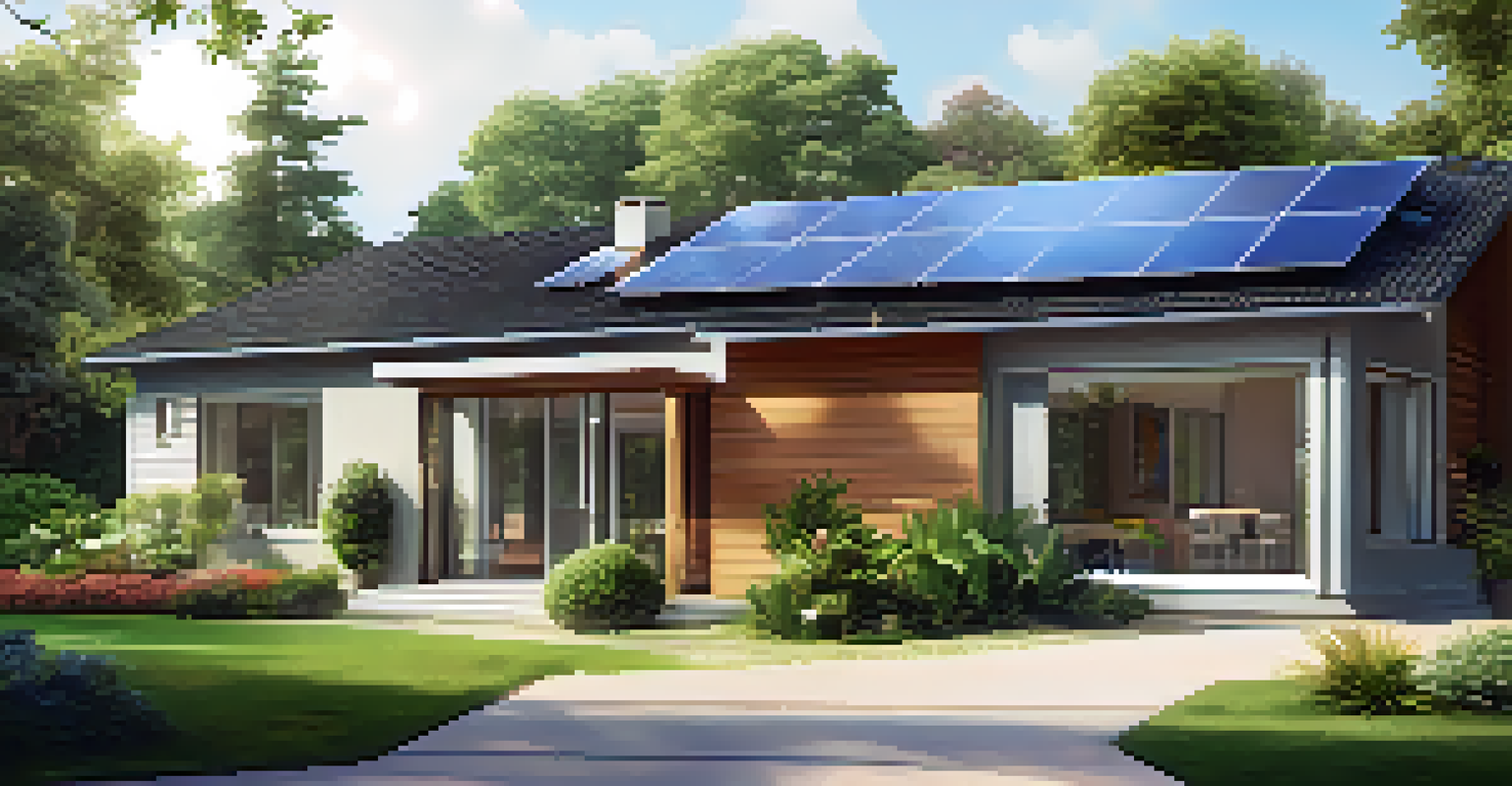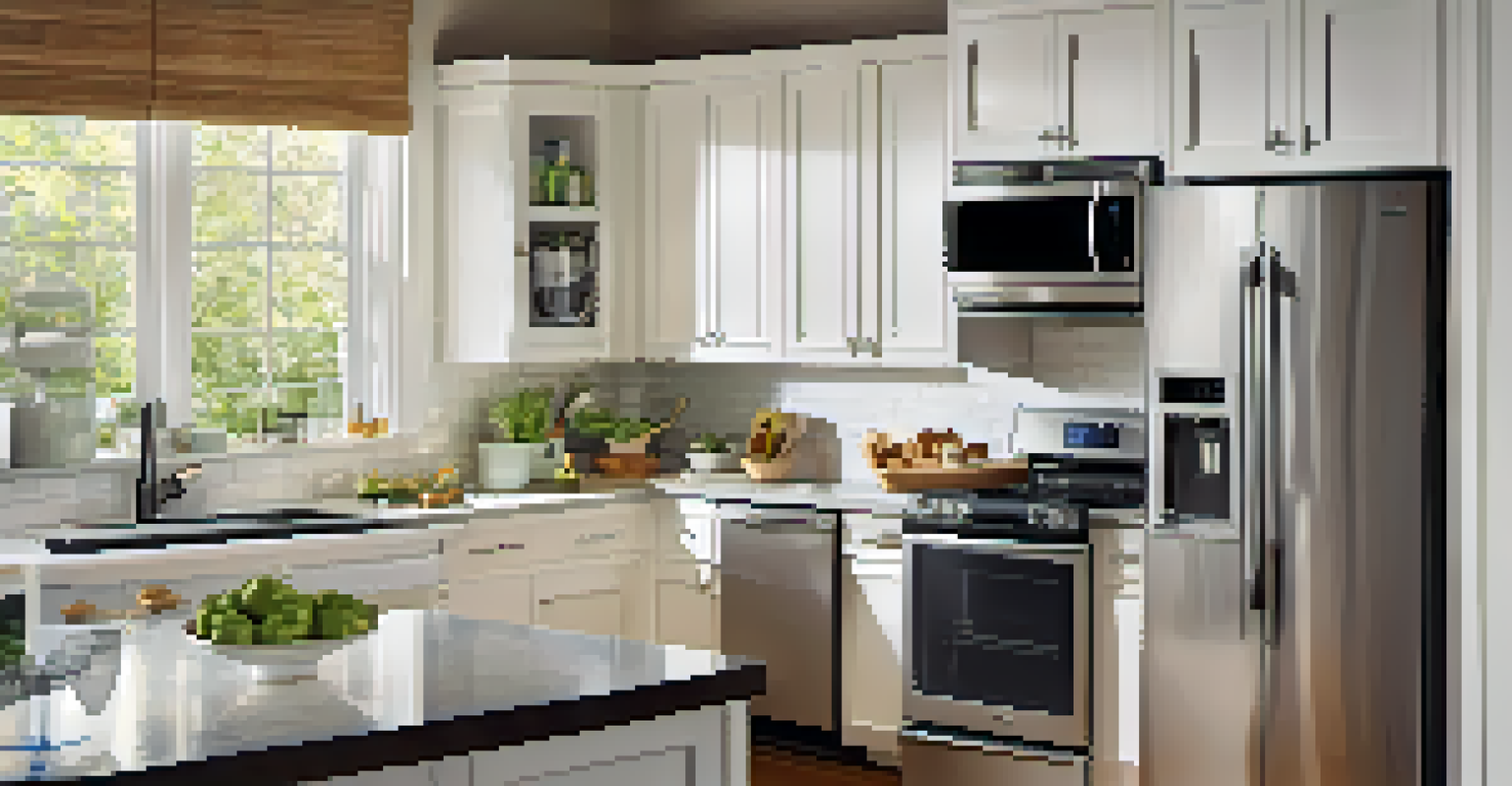Assessing the Value of Energy-Efficient Features in Homes

Understanding Energy Efficiency in Homes
Energy efficiency in homes refers to using less energy to provide the same level of comfort and utility. This includes features like high-efficiency appliances, better insulation, and energy-efficient windows. By reducing energy consumption, homeowners can save on utility bills while also contributing to environmental sustainability.
Energy efficiency is not just a cost-saving measure; it's a way of life that can lead to greater comfort and sustainability.
To put it simply, think of energy efficiency as a way to get the most out of every dollar spent on energy. Just like how choosing a fuel-efficient car can save you money at the pump, energy-efficient homes can significantly reduce your monthly expenses. This makes it a win-win situation for both your wallet and the planet.
With growing awareness of climate change and rising energy costs, many homeowners are prioritizing energy-efficient features. As a result, understanding how these features impact a home’s value has become increasingly important for both buyers and sellers.
Key Energy-Efficient Features to Consider
When assessing energy-efficient features, several key elements come to mind. These include energy-efficient windows, programmable thermostats, and Energy Star-rated appliances. Each of these features plays a significant role in reducing energy consumption and enhancing overall comfort in the home.

For instance, replacing old windows with double or triple-pane options can drastically lower heating and cooling costs. Imagine trying to keep a room warm on a cold winter’s night but feeling the chill seeping in through old, leaky windows. This simple upgrade can make a world of difference.
Energy Efficiency Saves Money
Upgrading to energy-efficient features can significantly reduce utility bills, benefiting both homeowners' finances and the environment.
Additionally, appliances that have earned the Energy Star label are designed to use less energy without sacrificing performance. This not only benefits the environment but also offers potential savings on energy bills, making these features valuable investments.
The Financial Impact of Energy-Efficient Upgrades
Investing in energy-efficient features can lead to significant financial benefits over time. Homeowners often experience lower utility bills, which can help offset the initial costs of upgrades. For instance, while a high-efficiency furnace may have a higher upfront cost, the savings on heating bills can quickly add up.
The greatest threat to our planet is the belief that someone else will save it.
Moreover, energy-efficient homes often have higher resale values. Buyers are increasingly looking for homes that offer energy savings and lower environmental impact. It’s similar to how a car with great gas mileage tends to fetch a higher price on the market.
In some cases, government incentives or rebates may be available for making energy-efficient upgrades, further enhancing the financial appeal. This means homeowners can enjoy immediate savings while also increasing their home’s value in the long run.
Evaluating the ROI of Energy-Efficient Features
When considering energy-efficient upgrades, calculating the return on investment (ROI) is crucial. ROI shows how much money you can expect to save compared to the initial investment. For example, if you spend $2,000 on energy-efficient windows and save $400 annually on energy bills, your ROI would be 20% per year.
It's important to note that some upgrades may offer better ROI than others. For instance, adding insulation typically provides a higher return than installing solar panels due to the initial costs involved with solar technology. Understanding these differences can help homeowners make informed decisions.
Higher Home Value with Efficiency
Energy-efficient homes often attract buyers willing to pay more, increasing resale value and market demand.
Additionally, tracking energy usage before and after upgrades can provide valuable insight into savings. Just like keeping a budget, monitoring your energy consumption can reveal trends and help you identify which improvements are paying off.
The Role of Home Inspections in Assessing Value
Home inspections are pivotal when evaluating the value of energy-efficient features. A qualified inspector can identify existing energy-efficient components and their condition, providing a clearer picture of the home’s energy profile. This information can be particularly valuable to potential buyers who prioritize efficiency.
During an inspection, features like insulation quality, window performance, and HVAC efficiency are assessed. Think of this as a health check-up for your home, where the inspector highlights strengths and areas needing improvement. A well-documented inspection can boost buyer confidence and lead to a smoother sale.
Moreover, having a thorough inspection report can justify the home's value, especially if significant energy-efficient upgrades have been made. This can help sellers communicate the benefits effectively and potentially secure a higher price.
Market Trends and Energy-Efficiency Demand
The demand for energy-efficient homes has seen a notable increase in recent years. More buyers are actively seeking homes that incorporate sustainable features, driven by a combination of environmental concerns and financial motivations. It's akin to the trend of organic food; people are becoming more conscious of their choices.
This shift in consumer preferences has had a ripple effect on the real estate market. Homes that highlight energy-efficient features are often more desirable, leading to quicker sales and potentially higher offers. Buyers are increasingly willing to pay a premium for properties that promise lower energy costs.
Smart Investments in Home Upgrades
Calculating the return on investment for energy-efficient upgrades helps homeowners make informed decisions to maximize savings.
Additionally, as energy prices continue to rise, the value of energy-efficient homes is likely to grow. Just like how the demand for fuel-efficient cars spiked during times of high gas prices, homeowners are prioritizing energy efficiency as a smart investment.
Tips for Homeowners Considering Upgrades
If you're a homeowner considering energy-efficient upgrades, start by assessing your home’s current energy performance. Conducting an energy audit can help identify areas where improvements are needed. Think of it as a treasure map, guiding you to the most impactful upgrades for your home.
Once you have a clear understanding, prioritize upgrades based on potential savings and ROI. Research available incentives or rebates that can help offset costs, as these can make upgrades more affordable. Just like shopping for a new gadget, it pays to compare prices and features before making a decision.

Finally, remember that even small changes can make a big difference. Simple actions, like switching to LED bulbs or sealing air leaks, can lead to noticeable energy savings without breaking the bank. Every little bit counts when it comes to creating a more energy-efficient home.